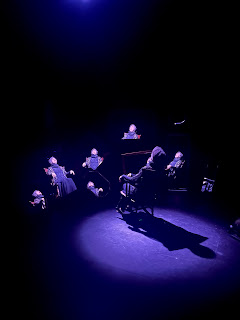Beckett. Women. – an evening of three short plays by Samuel Beckett
Directed and designed by Diana Zhdanova
145 Sixth Avenue, Manhattan, NYC
July 26-30, 2023
 |
| Kathryn Mederos Syssoyeva, Ylfa Edelstein, and Lesya Verba. Photo by Jarrett Robertson. |
It is tempting to argue that Samuel Beckett's particular marriage of experimental form with spare lyricism and compassionate cynicism remains unique in the dramatic canon.
Beckett. Women., from transdisciplinary performance collective AnomalousCo, stages a trio of Beckett's short plays centered on women,
Footfalls,
Not I, and
Rockaby, bringing its own unique vision to these works as it places them into dialogue with one another. Designed and directed by AnomalousCo Co-Artistic Director Diana Zhdanova, a queer dissident artist from Russia, the show features a triad of spellbinding solo performances from women artists that vividly demonstrate the enduring power of these plays.
The evening begins with
Footfalls, which concerns a now-middle-aged woman, May, who has sacrificed much of her life to caring for her mother and who incessantly paces the same strip of floor in precisely numbered steps, an evocation of entrapment (among other things) that is simultaneously an expression of control. This production's May, a captivating
Ylfa Edelstein, treads a path with a mirrored surface that suggests the externalizing reflection of inner experience in which the play deals. The published text of Footfalls identifies two voices, that of May and a "WOMAN'S VOICE" that emanates "
from dark upstage" (Grove Press edition, 1984), typically understood to be the voice of May's mother. Edelstein, in May's ragged drapery, performs both, which not only more assertively locates the "mother" within May but also suggests how May will eventually find herself in her mother's place, an inescapable commonality of mortality. The varying speed of Edelstein's titular footfalls might be seen to reflect this progression: at the start, her pacing is more rapid than one might expect, later slows to the more commonly staged deliberate, funereal pace, and later still becomes almost halting. At times, only Edelstein's feet are lit, reproducing May's own focus on corporeality, perhaps as proof of her own existence, in her recounted insistence on being able to hear each footstep. In the silence that otherwise pervades the theater, the audience too is acutely aware of each step, and they and Edelstein's words gain further weight within that blanketing quietness.
 |
| Ylfa Edelstein. Photo by Peter Yung. |
Footfalls gives way to another type of reminiscence in
Not I, a cascading monologue spoken by a woman's disembodied mouth. The monologue, uttered by a mature woman, alludes to the same kind of repetitive existence limned in a number of Beckett's works, including
Footfalls, and circles around an unspecified trauma of some kind. Native Ukrainian singer, artist, designer, musician, and actor Lesya Verba performs this
Not I in her own Ukrainian translation (Zhdanova recommends that the non-Ukrainian-speakers read the provided English text before or after the performance, though those familiar with Not I will have no trouble identifying the play's recurring denial and/or displacement of "what? .. who? .. no! .. she!"). This version, as many do, dispenses with the silent "Auditor" who appears in the published script, which aids in probably the best staging of the speaker that we have seen, the mouth's isolation within deep darkness by a light no bigger than itself producing a strong sense of estrangement. There is even a kind of pleasurable disorientation to be found in really focusing on this alienated body part as moves suspended in blackness. And Verba's performance demands that focus, as her voice soars and dives, engages in bouts of dazzling rapidity and trips to a stop for that aforementioned refrain, while the choice to sing portions of the text introduces a new dimension to its storm of speech.
 |
| Kathryn Mederos Syssoyeva. Photo: Jarrett Robertson. |
The program concludes with
Rockaby, performed by director, actor, teacher, and scholar Kathryn Mederos Syssoyeva, founding Artistic Director of AnomalousCo.
Rockaby presents us with a gray-haired woman's own (recorded) voice as she sits in a rocking chair. Suggestions of loneliness and confinement run through the voice's dialogue, and its repetition of "close of a long day" invites "close of life" as one interpretation of this phrase, especially in juxtaposition with the two other plays in
Beckett. Women. The woman in the chair's periodic monosyllabic demand for "More" from the voice might be connected to this as well; and the voice's delivery intriguingly changes with each "More." In the chair, Syssoyeva impressively expresses herself almost exclusively through her hand(s) and through the rocking itself, which varies (the creaking, for instance, lessening over time) and becomes, in conjunction with the dialogue (and in departure from the mechanical measuredness adhered to in many productions), almost incantatory in its force by the end. This production turns the woman in the chair away from the audience but adds a bank of differently sized and shaped mirrors that both establishes a visual and thematic link to
Footfalls and its reflective strip of floor and gives a new resonance to
Rockaby's lines about "facing other windows / other only windows": an image simultaneously of solitude and universality.
Together, the three plays that make up
Beckett. Women. weave a tapestry of experiences of aging, relationship, and mortality, and the production's stagings of all three draw attention to the importance not only of the recounting of such experiences but also of sound and rhythm in Beckett's work. With excellent performances as its vertices,
Beckett. Women. triangulates a fresh, female-forward presentation of a canonical playwright.
-John R. Ziegler and Leah Richards






Comments
Post a Comment